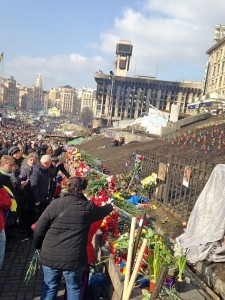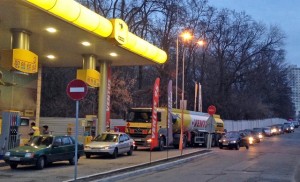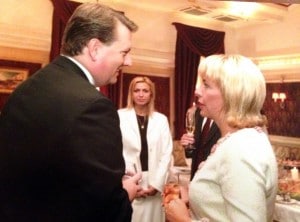
Ukrainians place flowers at the memorial in Kiev’s Independence Square in memory of the sniper victims. The burned out building in the background was the protestor’s headquarters, according to Mefford, before it was torched by riot police.
With 15 years invested in Ukrainian’s fight for democracy, former Arkansas grassroots politician Brian Mefford urges the U.S. to take a tough policy with Russia to prevent annexation of Crimea and to give strong support for the new Ukrainian government.
“If 25,000 Russian troops arrived in Alaska because they claimed it was their historical land, Americans wouldn’t tolerate it and would be ready to take decisive action to remove them. The same thing is happening in Crimea under much the same pretext,” said Mefford.
Over the last three months, Mefford has witnessed large daily protests, physical violence and intimidation of protestors by police, as well as stress on the financial situation. He is certain that Ukraine will become a full European Union country, but he expects a roller coaster in the interim.
“When it looked like martial law was about to be declared, there were lines of up to 20 cars at gas stations. A dozen or more people would wait in line at ATMs to withdraw cash. Grocery stores experienced runs as people stocked up on food in the event of war or martial law. Now the pressure is less but hard currency – U.S. dollars – is difficult to come by and the local currency has devalued by almost 25% since the crisis began in late November,” said Mefford.
With all of the political rhetoric on this situation dominating the news, Mefford offers a rare positive affirmation on the U.S.’s stance direct from the political trenches of Ukraine.
“The U.S. Congress doesn’t get complimented often, but they have done an excellent job of leading on the issues of Ukraine’s European choice, sovereignty and territorial integrity,” said Mefford. “In fact, it was bi-partisan leadership and action from Congress that forced the White House and State Department to get engaged in the issue.”
Mefford was recruited in 1999 to join the International Republican Institute (IRI) and was posted to Ukraine because the primary need was for building grassroots, which was a skill he knew well from his work in Arkansas politics. He has been in Kyiv since 2010 working as an independent business and political consultant for pro-Western politicians in the region.
His work in Ukraine and the surrounding region includes advising politicians, organizing international election observation missions and consulting Western businesses wanting to work in Eastern Europe. Among his previous clients are former Ukrainian President Victor Yushchenko, members of the Ukrainian Parliament, the U.S. Soybean Export Council (USSEC), and the International Research & Exchanges Board (IREX). He also serves as Executive Director of the Committee for Open Democracy, which organizes international observers for critical elections in Eastern Europe. Over the last four years, they have had officially accredited observers in a dozen elections in six countries to prevent fraud and ensure that the elections meet international standards.
For his accomplishments, the Kyive Post newspaper recently named Mefford as one of the “Top 20 Most Influential Expatriates in Ukraine.”
He began political work at age 16 in Harmony Grove, Ark., and won his first elective office as a City Alderman in East Camden at the age of 18. A year later, he was elected to the school board in Harmony Grove.
His leadership continued as a student at Southern Arkansas University. He was Student Government Association President for two years, Arkansas State Chairman of the College Republicans in 1992-93, Phi Beta Lambda (PBL) State Parliamentarian and was active in the Baptist Student Union. He earned a bachelor’s of business administration and a minor in political science from SAU in 1994.
“SAU did a good job of preparing me for the real world of business and politics,” said Mefford. “In fact, American universities excel worldwide in getting graduates ready for the workforce. I have traveled to 49 countries and 10 of 15 former Soviet Republics. One observation that has been reinforced by my travels is that the American higher education system is second to none because of the emphasis on practical skills and analytical thinking.”
Back at Mefford’s internationally diverse alma mater, there are currently three SAU professors that originate from Ukraine.
Dr. Natalia Murphy, SAU assistant professor of history, political science and geography, was born and raised in Southern Ukraine and is concerned for her family and for Ukraine and the region.

Mefford said that when it looked like martial law was about to be declared, lines formed outside gas stations and ATM machines.
“The situation in Ukraine is very complex and personal for me. My parents still live in Mykolaiv, and I have family members living in Sevastopol, Crimea,” said Murphy. “As devastating as it is to lose territories, Ukraine and Ukrainians have to move as one and concentrate on the future. In my opinion, Crimea is lost. Now we need to ask who will protect Crimean Tatars (a Turkic minority) and Ukrainians, because both have always been minority groups in Crimea.”
According to Murphy, the Crimean secession referendum is very dangerous not just for Ukraine, but for the other ethnicities that live in Crimea that do not want to be reunited with Russia and also for oblasts or states with a Russian minority that Russia can say are having their rights violated.
“I spent my summers growing up in Sevastopol, and it is my experience that not everyone in the city thinks of himself or herself as Russian. I worry for their safety not just from the Russian military, but also from their neighbors that hate them for not being Russian,” said Murphy.
Dr. Ganna Lyubartseva, SAU assistant professor of chemistry, is from the beautiful city of Sevastopol in Crimea, which is home to around 380,000 people and is getting a lot of attention on the news because of Russia’s presence there. Lyubartseva has family that still lives there, who are surprised that she has been checking on them so often.
“In my opinion, the news we are reading is a bit exaggerated,” said Lyubartseva. “My sister works as a nurse in Sevastopol and she goes to work every day as usual. Sometimes she just laughs about the news. Yes, there is a presence of Russian troops in the city that makes people feel uncomfortable and worried, but still whoever needs to work is working. Stores are open, birthday parties are going on. At least my family in Sevastopol is doing just fine.”
Lyubartseva would prefer Ukraine to be a part of the European Union, but realizes that there is no way Ukraine can be open to Europe and closed to Russia.
“As a country, we need support from both sides, but definitely, I would prefer the disturbances in my country to stop, and stop soon,” said Lyubartseva.
Dr. Viktoriya Street, associate professor of biology at SAU, is from Eastern Ukraine, and she too has high hopes for a quick and peaceful resolution.
“I hope that despite their differences, the people of Ukraine will find common ground through talking and having open communication,” said Street. “The people of Ukraine are strong. They survived the challenges of 1990 and they will survive today’s situation and continue to move forward.”

